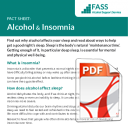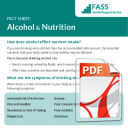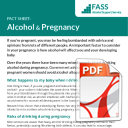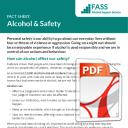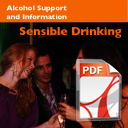Lowered inhibitions
You might notice that after you've had a couple of drinks that you're chatty and confident.
This is because alcohol suppresses some of our brain functions and in small amounts can make us feel stimulated because it lowers our inhibitions.
However the more we drink, and the further we block out our nervous tissue functions, we show the classic symptoms of being drunk like slurred speech, unsteady balance, different perceptions and an inability to react quickly.
Dulled senses
The way we process information from our senses gets slowed down too, which means after a few drinks we have trouble seeing, smelling, touching and tasting. As well as this our pain threshold gets higher because we're more cut off from our senses.
Impaired judgement
Drinking too much at a time makes us lose control of our 'normal' social behaviour. Our thought processes are affected so we're no longer able to use good judgement or think clearly. That's why people act differently when they are drunk and often make decisions that they later regret.
Memory loss
Have you ever woken up after a night of drinking and couldn't remember parts of the evening until someone else reminded you? This happens because alcohol affects the brain's ability to make and retain memories.
More worryingly, some people experience complete blackouts and even when reminded, the memories don't come back. This is because their brain was unable to complete the process for making a memory. They have lost a gap of time and will never get it back.
Exaggerated emotions
Alcohol also affects the part of our brain that controls our emotions so it gives us exaggerated emotions like elation, anger and sadness. This puts us (and the people around us who are drinking) at risk of getting into arguments and becoming aggressive or violent.
Loss of balance and co-ordination
Alcohol affects our movements and makes us lose co-ordination. It disrupts our sense of balance, so if you've drunk more alcohol than your body can process, you will lose your balance a lot. At this stage, you might be described as 'falling down drunk’.
Alcohol poisoning
The brain stem controls all the bodily functions we don't have to think about like breathing, heart rate, temperature and consciousness. When alcohol starts to affect your brain stem, you'll start to feel sleepy and may fall unconscious. If the alcohol content in your body is high enough this can be fatal as your breathing will slow down or even stop completely.
Accidents
If you drink, you'll know that minor accidents happen all the time. On a night out you may find yourself bumping into things more often or tripping up and so on. But alcohol is also the cause of more serious accidents. As we've seen, alcohol affects our judgement, senses, reactions, concentration, balance, co-ordination and it makes us drowsy.
So it's no surprise that alcohol is a major cause of accidents and accidental injury in the home, on the roads, in workplaces or during leisure time. It's also one of the main causes of falls, collisions, drowning and fires.
Illness
Alcohol irritates the lining of the stomach and intestine which can cause sickness. It reduces the blood flow to our muscles which can give us muscle ache, a classic symptom of a hangover.
Alcohol also increases blood flow to the skin causing us to sweat and look flushed. From sweating we can lose heat and our body temperature may fall below normal. Going out into cold weather for any length of time from a warm pub or club can put you in harm’s way and at risk of hypothermia, so make sure you wrap up!
Sensible Drinking
Our Sensible Drinking booklet has more information and is available in the sidebar of this page. Sensible Drinking is just one in a range of free Alcohol Support and Information leaflets and booklets that can be downloaded here.
